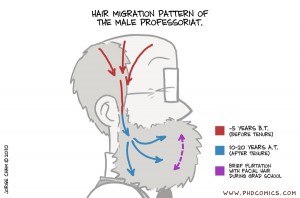A Few Missing Steps
7 August 2013 | By
After a long hiatus from US ATLAS, I recently started a new job at the Lawrence Berkeley National Laboratories. It's one of the few remaining labs in the US funded by the Department of Energy that does basic science research. It's the fourth job I've had in four years, all working on ATLAS, and all working on similar projects. This one is different, though: if I pass a performance review a few years from now, I'll have the lab-equivalent of tenure. I've had reactions ranging from "who did you have to kill to get that job" to "so who did you actually talk to to land that"?

At the same time, some friends recently pointed out this article breaking down becoming a professor into a few short steps. Well, not so short. From the looks of things, the average time to complete all the steps is 15-20 years. I feel like they may have missed a step or two, as well as a few features of the system, which might be new to some of you. So here, remembering that I'm not an expert in the field of getting a professorship, are a few small steps that they left out:
- Be in the right place at the right time. I was lucky enough to be one of the first graduates from the LHC with real collision data in my thesis. A few years earlier and I would have either been working on another experiment or not have had the opportunity to help get the detector and software up and running - the latter of which is quite important for job hunts. It's important to have done some physics analysis (either a search or a measurement), but it is critical to have also done some work on the detector itself!
- Have the right person retire at the right moment. These days in our field, new positions only open because someone left. Some groups are wise enough to try to hire a new person a few years before their oldest professor is going to retire, so that the new person can be well trained in the operation of the group and the experience can be passed on, but very few have a truly "new" job open up. In my case, a very good guy at Berkeley decided it was time to retire and build a kit car for a few years. And so, a position was born.
- Happen to have spent the last five years becoming an expert in the areas that the group most wants an expert in. Some groups really want a person who will work on a particular piece of the detector, or a particular physics topic (even more specific than just "working on ATLAS", for example, some groups want someone who will help measure the Higgs boson properties). In my case, the person who retired was one of the few physicists who had mostly worked on software at the end of his career, and our experiment's software is what I've worked on since I started on ATLAS years ago.
- Compete against your friends. There are simply not enough jobs in our field for all the good candidates. And I really mean good. Some of the people that I've gotten to know here I have enormous respect for as physicists. And, of course, it happens that the people applying for jobs at the same time are all about the same age - and are all the friends you've been making in the field.
If it sounds like there's a lot of luck involved in getting a job, that's because there does seem to be these days. It's an unpredictable challenge, and there are a lot of good physicists who end up getting overlooked by the process. I was very lucky, though there's an old saying, "Luck is the residue of design." The design wasn't my own in this case, so this is my chance to thank all the people who helped get me here!
Now that I'm back, who's got a question I can help answer?




